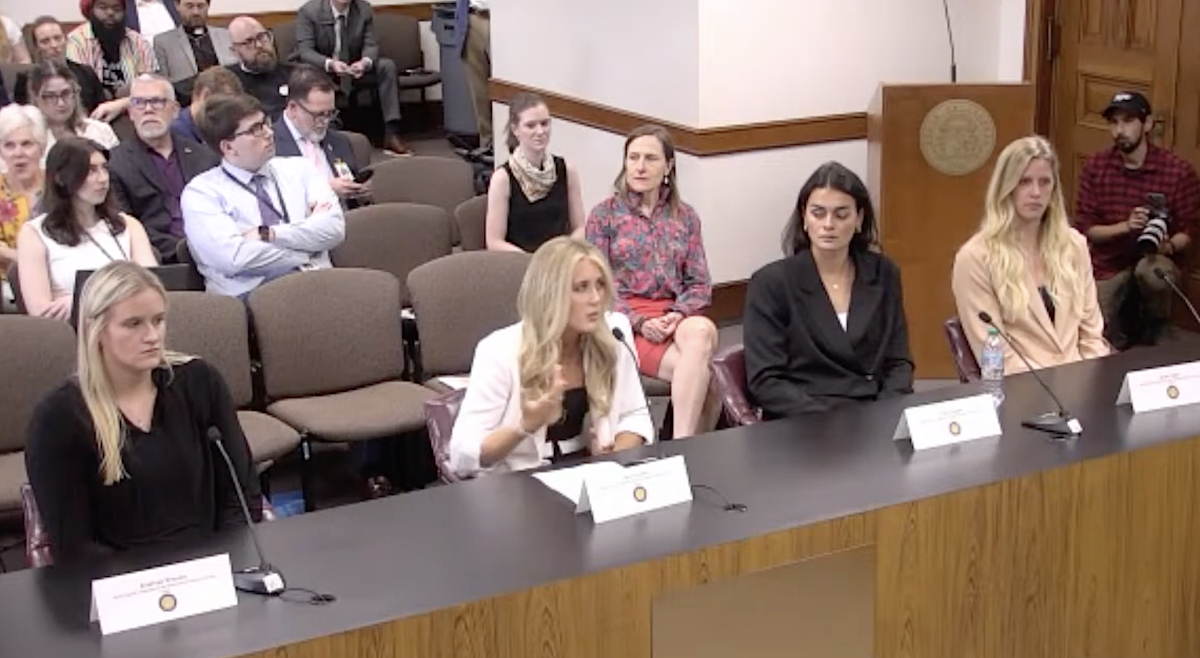(Georgia Recorder) — How to keep transgender women out of sports competitions is once again the topic of discussion under Georgia’s Gold Dome as state senators convened a meeting of a new special committee on protecting women’s sports Tuesday.
The hearing featured a group of college swimmers who say they were put at an unfair disadvantage by being made to compete against a transgender athlete.
Transgender sports bans have gained political traction in recent years as proponents say transgender women have unfair advantages in contests of strength over cisgender women. Opponents say the bans offer red meat to conservative voters but have little impact beyond scapegoating a small and vulnerable group.
Georgia has passed legislation seeking to keep transgender girls out of sports in the recent past, including in 2022, when lawmakers passed a bill setting up the Georgia High School Association to require students to play on a team that matches the gender assigned on their birth certificate.
The association did so, but Lt. Gov. Burt Jones, who set up the committee, said that law did not go far enough and he hopes to claim the power invested into the GHA for the Legislature and expand restrictions to collegiate sports.
“I was still in the Senate when this issue had been talked about and kicked around, and I thought it was an issue that we, as legislators at the time, had an opportunity to act on it but we ended up punting the matter to the Georgia High School Association, which I think was unfortunate and I think was the wrong move for us to do. However, we do have an opportunity to correct the misgivings from the past, and I think we should take that opportunity,” Jones said.
The women are all plaintiffs in a federal lawsuit over the 2022 NCAA Division I Swimming and Diving Championships hosted by Georgia Tech in Atlanta. Lia Thomas, a transgender swimmer, won the 500-yard freestyle race at the meet, becoming the first transgender woman to win an NCAA championship.
“I feel so frustrated. That’s how I feel. I feel frustrated, I feel betrayed, I feel heartbroken, I feel demoralized that we have to be here,” said University of Kentucky swimmer Riley Gaines, who has become an activist against transgender participation in women’s sports.
Gaines read a letter she wrote to Georgia Tech president Angel Cabrera alleging that the university allowed women to be violated and traumatized by being forced to compete against and share changing facilities with Thomas.
The chairman of the committee, Cumming Republican Sen. Greg Dolezal, said Georgia Tech and the NCAA declined to participate in the hearing citing ongoing litigation.

Gaines was joined by Reka Gyorgy of Virginia Tech, Kylee Alons of North Carolina State University, Grace Countie of the University of North Carolina, and Kaitlynn Wheeler of the University of Kentucky. The swimmers said they dedicated countless hours of training to becoming among the top swimmers in the nation and feel betrayed by the NCAA and Georgia Tech.
Alons said she was forced to change in a storage closet because Thomas had access to the women’s locker room.
“It was beyond ironic to me that the NCAA was paying lip service to women’s equality while disregarding women’s bodily privacy and allowing a man to take away women’s opportunities. What good is a women’s division if a male swimmer can enter it and dominate the competition? And how can women have equal opportunities if a man can enter women’s events and win but no woman can enter men’s events and win?”
According to the Human Rights Campaign, 23 states, including Georgia, have passed laws restricting transgender students’ ability to play sports. Transgender advocates say such laws put politics over students and have the capability to harm vulnerable youths.
“While those in support of excluding transgender students from sports promote anecdotal evidence stating to show trans people negatively impact women’s sports, the data does not back this up,” said Cait Smith, director of LGBTQI+ Policy at the Human Rights Campaign.
Smith said the Olympics have allowed trans women to compete since 2004, but no trans woman has won a medal in that time.
“In addition to the Olympics, several professional and recreational leagues have trans-inclusive policies,” she added. “Many here today are focused on one student who won one final at one championship two years ago. If trans women have such a clear advantage in sports, why do you not see them winning many more championships and throwing team rosters? At the college level, the NCAA has allowed trans students to participate since 2011, though individual schools and sports are able to set their own policies. These specific policies are often tailored to their sport and their community, as they should be. Decisions about what works best for a given sport or school should be made by the schools and sports associations themselves, not by politicians.”
Dolezal did not see it the same way. He said the discussions will continue until next year’s legislative session, set to begin next January, when lawmakers can create new state laws.
“My anticipation is to hold monthly meetings between now and December and then to submit a committee report that will hopefully provide clarity on this issue, that will highlight the committee’s good work, and potentially will outline legislative priorities that the committee finds are worth looking into in the upcoming legislative session,” Dolezal said.







